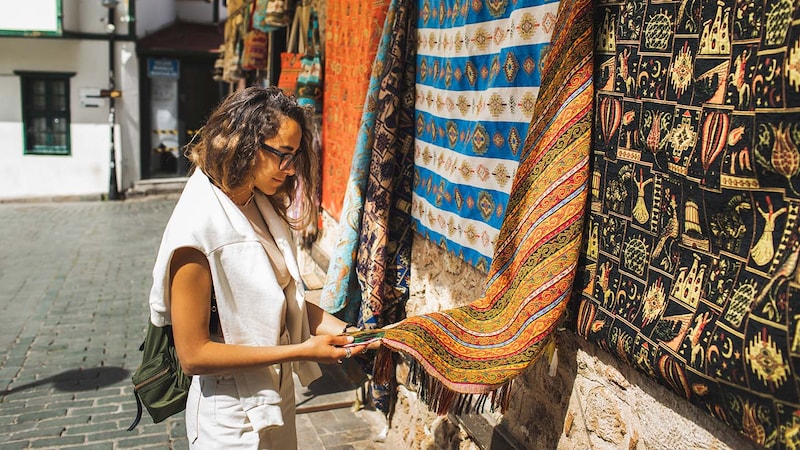Credit card or cash: How to pay in Turkey

Quick insights
- Credit cards are widely accepted in Turkey, especially in major cities and tourist-friendly areas.
- Cash may be preferred when making smaller purchases, tipping or shopping at local merchants.
- Depending on your credit card, you may be charged foreign transaction fees while using credit cards abroad.
Turkey is known for its rich history, colorful bazaars and strong coffee. If you’re visiting, you may be eager to soak up all there is to see and do. That can include purchasing souvenirs and booking excursions to serve as priceless mementos of your time in Turkey. But how will you pay for them and what are your options?
In this article, we’ll explore how you can pay for things in Turkey and when it may be best to use cash or a credit card.
Paying in Turkey
Paying with cash tends to be more common in Turkey than the U.S., but credit cards are still widely accepted. Using credit cards in Turkey is common, especially if you’re in major cities and tourist-friendly areas. But credit cards may not always be the best option.
Having cash can come in handy too. You may encounter merchants that don’t accept credit cards—or the type of card you have. Cash can be a great backup in these scenarios. Plus, there are times when paying with cash will be preferred.
In Turkey, you may want to consider using cash in the following places:
- Tipping: When dining out or doing activities that might require tipping, consider having cash on hand.
- Small shops and bazaars: Vendors in smaller shops or stalls within traditional Turkish bazaars may prefer cash over credit cards.
- Public transportation: While major cities, like Istanbul, have card payment options for public transportation, in some smaller towns or for certain types of transportation (like minibuses), cash might be required.
- Taxis: Although taxis in larger cities typically accept credit cards, some drivers may prefer cash.
- Turkish baths: This popular Turkish pastime is one instance where cash may be the preferred form of payment, particularly if it's a local establishment that does not cater to tourists.
It can be impractical to carry around large amounts of cash, but having a small amount of bills can give you flexibility. Using a mix of cash for small purchases and credit cards for larger purchases may provide the most seamless buying experience.
Depending on your card issuer, you may want to alert them to your travel ahead of time. However, some card issuers—including Chase—do not require notice when traveling.
Alternative payment methods
Cash or card may not be the only payment option. With the rise of digital payment methods, you may also find merchants who allow you to pay via mobile wallet or QR code. However, popular U.S.-based digital wallets—like Google Pay and Apply Pay—are not available in Turkey due to local banking laws.
International card and ATM fees
Converting U.S. dollars to Turkish lira may incur fees—whether you’re getting cash or swiping a card. Common fees include foreign transaction fees, currency conversion fees, dynamic currency conversion (DCC) fees and ATM fees:
Foreign transaction fees
You can be charged foreign transaction fees when using your credit or debit card to make purchases outside of the U.S. These fees can vary depending on your credit issuer, bank and the purchase amount. The rate for foreign transaction fees is typically 1-3% of the entire purchase, which might include shipping costs and taxes.
However, some credit cards do not charge foreign transaction fees, so you may be able to avoid them altogether. Check your cardmember agreement for details on international purchases. If you travel often, it may be worth looking into a travel rewards credit card that may not charge foreign transaction fees.
Currency conversion fees
When you exchange one currency for another, you may be charged a currency conversion fee. Currency conversion fees are charged during transactions that involve converting currencies.
They can occur when you make purchases abroad using a credit or debit card, withdraw cash from an ATM in a foreign country or exchange currency at a bank or currency exchange service. The amount can vary, but these fees are typically 1-3% of the transaction amount.
Dynamic currency conversion (DCC) fees
Merchants typically use a DCC service that allows a transaction to be processed in the cardmember’s home currency. The customer pays fees for this service when making a purchase and often receives an unfavorable exchange rate.
You may be able to avoid DCC fees when using a credit card. Paying in the local currency means you won’t be charged DCC fees. Sometimes the merchant can select the currency before handing you the payment terminal, or you may need to select it yourself.
When you pay in lira, you’ll still be subject to the fees and exchange rates associated with your credit card, but in many cases, those terms are more favorable than what DCC services offer.
ATM fees
Your bank may charge a fee if you withdraw cash from ATMs. Often, the ATM operator charges a fee as well. These fees are typically two-fold and include a flat fee as well as a percentage based on the amount you withdraw.
When exchanging dollars for lira, you may find better rates if you plan ahead. Often, using a currency exchange at the airport or in a hotel while abroad will not provide the best exchange rates. Exchanging money at your local bank or credit union before traveling may be a better option.
Benefits of using credit cards in Turkey
There are some benefits to using credit cards while traveling, including:
- Ease of use: It is often simpler to swipe a card than it is to count cash at a register, especially with foreign currency.
- Safety: Cash can get lost or stolen, and when it’s gone, it’s gone. Whereas if your card is lost or stolen, you can lock your credit card and monitor its usage.
- Rewards: Using your card abroad may earn rewards points or miles, depending on the card. If you’re using a travel credit card, you may earn higher rewards for travel-related purchases.
- Card benefits: Using your card to make purchases may also provide additional benefits, such as travel insurance or fraud protection.
While most major credit cards are accepted in Turkey, payment acceptance is left to the discretion of the merchant and not every card type may be accepted. For this reason, you may want to consider having cash to fall back on.
In summary
Credit cards are generally accepted in Turkey, however, having cash on hand may be useful. When shopping at local vendors or traveling to smaller towns, you may encounter merchants who don’t accept credit cards. While cash may be more popular in Turkey than the U.S., credit card use is common.
You may encounter fees when converting currency, getting cash from ATMs or using credit cards in Turkey. There are credit cards that do not charge foreign transaction fees, so you may be able to avoid some fees when making purchases in Turkey. Note that such travel credit cards usually come with an annual fee.



